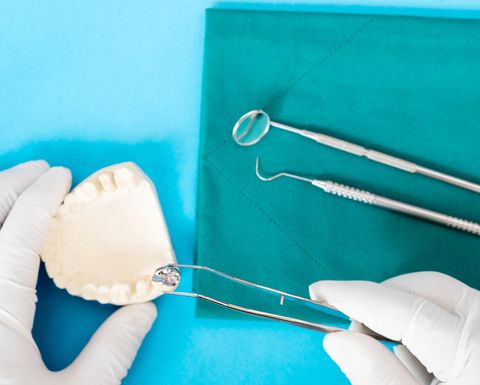Maxillofacial Prosthetic and Prosthodontist
What is a Prosthodontist?
A Prosthodontist specializes in dental prostheses, including the aesthetic restoration and replacement of teeth. Prosthodontics is among the 9 dental specialties recognized by the American Dental Association (ADA), and defines it as a specialty that pertains to the diagnosis, treatment, rehabilitation and care of a person’s oral function, appearance, comfort and health. It treats patients with deficient or missing teeth and/or maxillofacial and oral tissues by utilizing biocompatible alternatives.
To become a certified prosthodontist, a dentist needs 3-4 years of additional training so they will acquire the knowledge and skills to restore the appearance and function of a person’s smile.
The American College of Prosthodontists (ACP) is the governing body that ensures standards are upheld in this particular field. Just recently, the Commission on Dental Accreditation (CODA) which is part of the ADA, passed the revised educational standards for all prosthodontics programs in the country which requires dental implant placements at a comprehensive competency level. Training to become a prosthodontist consists of thorough clinical and instructional preparation in the anatomy of the head and neck, implant surgery, biomedical sciences, biomaterial sciences, bite function and TMJ. Training also involves treatment planning and hands-on experience in treating full-mouth reconstruction, TMJ related disorders, sleep apnea, cosmetic dental issues and congenital disorders.
Currently, there are approximately 3,200 prosthodontists in the country, and 170,000 general dentists. The demand for this profession is very high, with Forbes consistently ranking it as the 6th or 7th most competitive and well paid jobs.
Prosthodontics is the only dental specialty under which the concentration of cosmetic/esthetic dentistry falls. General dentists are allowed to perform simple cosmetic procedures. But there are concerns raised regarding whether it is ethical for general dentists to handle “smile makeovers” and other complex cosmetic reconstruction cases, considering that they are not qualified to address such problems. The ADA also does not recognize any specialty for dental implants.
What is an Oralmaxillofacial Prosthodontics?
Oral and Maxillofacial Prosthodontics is a sub-specialty of Prosthodontics. To become a Maxillofacial prosthodontists, a prosthodontist needs to finish prosthodontics education first and then proceed to fellowship training for one year focusing exclusively on Maxillofacial prosthetics which is composed of oral surgical and prosthodontic treatments.
A maxillofacial prosthodontist treats patients with acquired and congenital defects of the neck and head (maxillofacial) region as a result of birth defects, cancer, trauma or surgery.
A maxillofacial prosthodontist can plan and fabricate maxillary obturators, mandibular-resection prostheses, and speech-aid prostheses. They can also work with an anaplastologist to create artificial eyes, nose, and other facial prostheses.
With their exhaustive training in prosthetic reconstruction and capability of handling a lot of complex cases, Maxillofacial prosthodontists have often been called the “bullet-proof” dentists.



